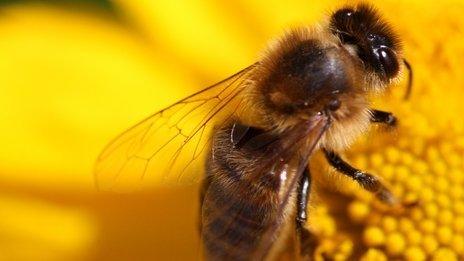Talks in Aberystwyth over Welsh bee decline action plan
- Published

The action plan hopes to halt the decline of bees
The progress of an action plan to protect endangered insect pollinators like honey bees and hoverflies in Wales have been discussed in Aberystwyth.
The value of pollinators to the UK government is estimated to be £430m a year, but populations have been on the decline for 30 years.
The Welsh government launched the action plan at the Royal Welsh Show in Powys in July.
Since then a review has looked at the reasons for the insects' decline.
The action plan will be developed in partnership with key agencies and might include changes to the planning system to help make development "pollinator friendly".
Other plans include planting more bee-friendly plants in areas such as railway embankments and road verges.
The Welsh government held a workshop at Aberystwyth University on Monday to share the results of its review with Friends of the Earth Cymru, the Welsh Bee Keepers' Association and wildlife trusts.
Speaking before the meeting, Peter Barrar, a director of National Bee Keeping Centre Wales, said: "A number of policies and programmes will be put forward for discussion and hopefully we're going to have a situation where we have an action plan that (can be implemented) throughout Wales, and addresses some of the really key issues that are facing pollinators, not just in Wales, but throughout the UK as a whole and elsewhere."
Mr Barrar said there was probably four of five issues affecting pollinators.
"Firstly, I think we've got problems with the loss of natural habitats which have resulted from ways in which we now manage the land," he added.
"For example, 97% of the UK's wild flower meadows have disappeared since the 1930s. That's an incredible impact due to farming practices and so on.
"There are issues about the use of pesticides which many beekeepers believe are having a disastrous effect, on not just bees, but on other pollinators as well."
'Population decline'
Prof Pete Barrar from the National Bee Keeping Centre of Wales explains more
Environment Minister John Griffiths said 20% of the UK's cropped area was made up of pollinator-dependent crops.
"In July I announced that Wales would produce an action plan for pollinators," he added.
"Since then a review has been undertaken in Wales to look at the reasons for the population decline and the impacts that such a decline will have upon our society.
"We now want to share this report with our relevant partners and take their views on how we can protect this vitally important eco-system service.
"Their views and expertise will be crucial is helping to shape this action plan which is the first of its kind in the UK."
- Published27 July 2012